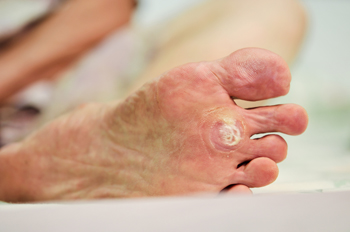Merrillville, IN
Munster, IN
Treatment Options for Plantar Warts
Tuesday, 12 November 2024 00:00
Plantar warts are small, rough growths that typically appear on the bottom of the feet, often on the balls and heels due to constant pressure. These warts are caused by the human papillomavirus, or HPV, entering through small cuts or weak points in the skin. Although plantar warts often resolve on their own in children, adults may need more proactive treatment. A podiatrist can offer a variety of medical treatments to eliminate plantar warts effectively. Cryotherapy, which involves freezing the wart, is a common clinical procedure, as is using prescription-strength salicylic acid to gradually peel away the wart. For persistent cases, options like minor surgical removal, laser therapy, or immunotherapy may be recommended. These treatments aim to remove the wart and reduce the risk of recurrence by addressing both the wart itself and the virus. If you have a plantar wart, it is suggested that you schedule an appointment with a podiatrist for treatment.
Plantar warts can be very uncomfortable. If you need your feet checked, contact Ahmad Elsamad, DPM from The Institute of Foot & Ankle Reconstructive Surgery . Our doctor will assist you with all of your foot and ankle needs.
About Plantar Warts
Plantar warts are the result of HPV, or human papillomavirus, getting into open wounds on the feet. They are mostly found on the heels or balls of the feet.
While plantar warts are generally harmless, those experiencing excessive pain or those suffering from diabetes or a compromised immune system require immediate medical care. Plantar warts are easily diagnosed, usually through scraping off a bit of rough skin or by getting a biopsy.
Symptoms
- Lesions on the bottom of your feet, usually rough and grainy
- Hard or thick callused spots
- Wart seeds, which are small clotted blood vessels that look like little black spots
- Pain, discomfort, or tenderness of your feet when walking or standing
Treatment
- Freezing
- Electric tool removal
- Laser Treatment
- Topical Creams (prescription only)
- Over-the-counter medications
To help prevent developing plantar warts, avoid walking barefoot over abrasive surfaces that can cause cuts or wounds for HPV to get into. Avoiding direct contact with other warts, as well as not picking or rubbing existing warts, can help prevent the further spread of plantar warts. However, if you think you have developed plantar warts, speak to your podiatrist. He or she can diagnose the warts on your feet and recommend the appropriate treatment options.
If you have any questions please feel free to contact our offices located in Merrillville, and Munster, IN . We offer the newest diagnostic and treatment technologies for all your foot and ankle needs.







